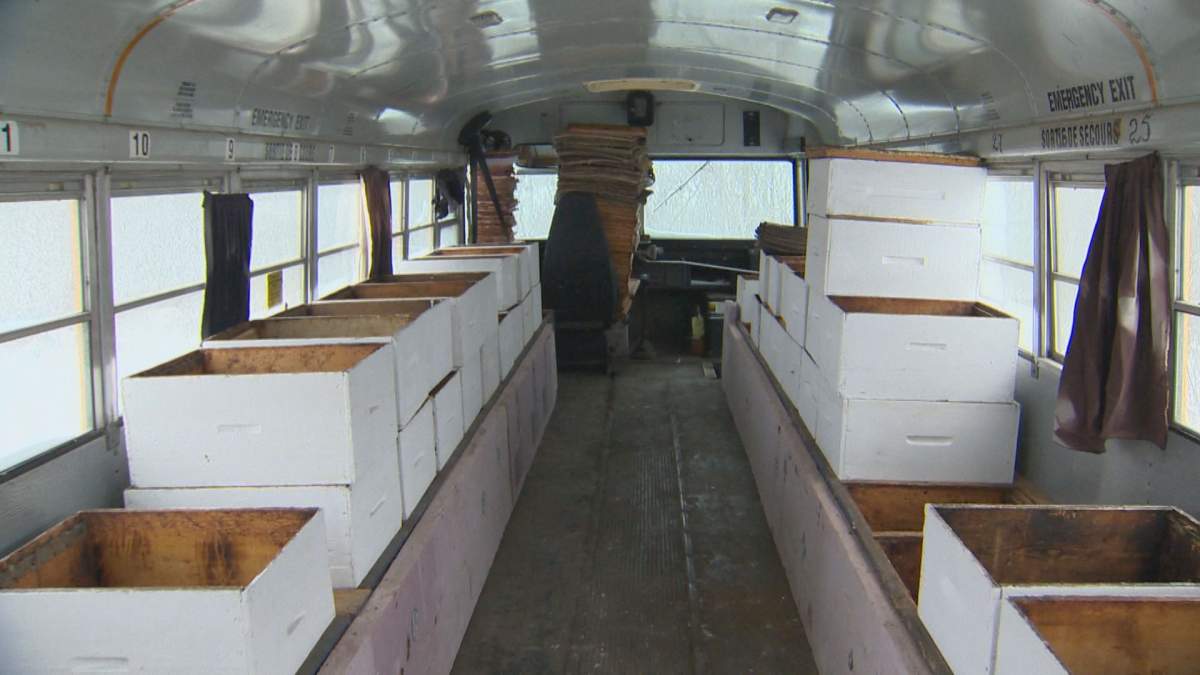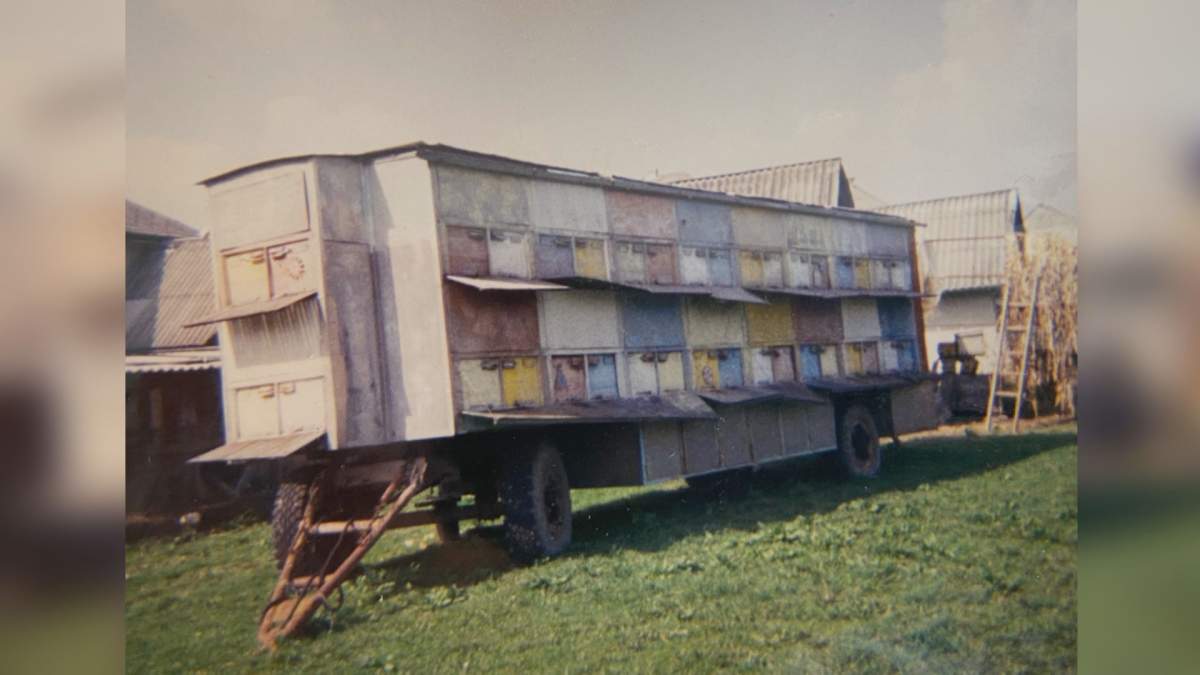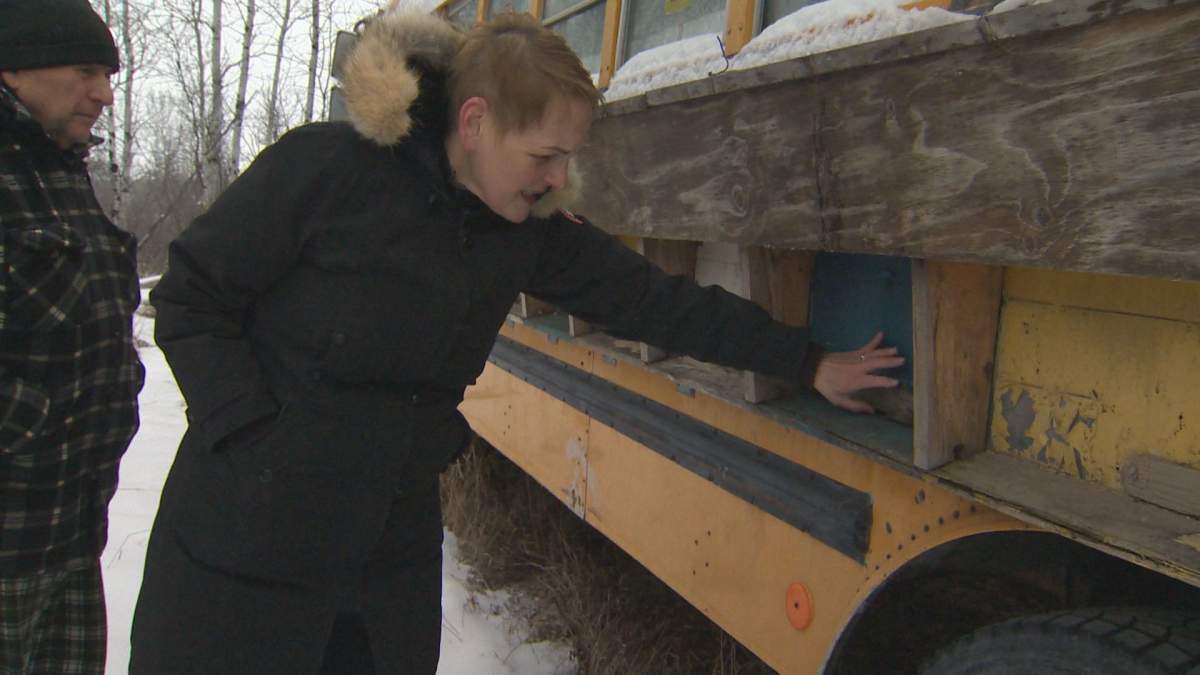There are four school buses on the Kostrabas’ property near Beausejour, Man.

One, parked next to the house, stores a winter’s worth of firewood.
Two more, down a narrow road leading further into the acreage, are filled to the ceiling with barrels, boxes and frames, with more piled in heaps on the ground nearby.
The fourth bus is for sale.
Mike Kostraba, 77, pulls open the bus’s squeaky back door and climbs in, followed by his wife, Iryna, and their daughter, Iryna Ayano. They’ve cleaned it out, ready to pass on to a new beekeeper.
Mike remembers when he first had the idea to transform a school bus into a travelling apiary. He speaks in Ukrainian, translated by Ayano.
“When we came here, we saw that it would be good to have bees in the bus, especially because of the bears,” he said.
That was 12 years ago. Despite his family’s insistence that he was “too old” at 65 to build it, Mike got to work. He ripped out the seats and drilled through the walls. Each hole leads to a hand-built box on the inside of the bus — beehives, with frames to hold precious honeycomb.
The bus is insulated so the bees can survive in their homes over the winter, and up to three more boxes can be piled atop each of the 35 hives as they grow.
“There is a huge potential here with beekeeping, because of the abundance of crops and honey-producing things,” Mike said.
He would know. He and Iryna were professional beekeepers in Ukraine until they left for Canada in 2005.

Get breaking National news
The couple met when Iryna was visiting some family in Mike’s village near the Carpathian Mountains. Soon after they got married, Mike was buzzing with excitement for a new hobby.
“I was very young, and I just loved bees,” he said. “My wife did not. And I kept persuading her, ‘Let’s buy some bees, let’s start!'”
“At first I was afraid of bees,” said Iryna, translated from Ukrainian by Ayano.
The couple bought seven hives, but shortly after, Mike’s job forced him to be away from home for days at a time.
“I didn’t want to leave the bees without care and let them die,” Iryna said. “I started studying them and learning about them. I just fell in love.”
Iryna quickly grew their hobby into a business, breeding queen bees and collecting honey, propolis and royal jelly to sell. And there was no rest for Mike when he was back in town.
“I would just tell him, ‘This is how many hives I need. This is how many boxes you have to make,'” Iryna said.
The couple had four daughters, all of whom helped with the family business. They built hives on a trailer, driving their bees to flowering fields in the region.
But for the Kostrabas, the bees are more than just a source of income.
“Bees are so organized, and just to observe that complexity of their lives, and of their order… that’s what I like about it.” Mike said.
He’s even given Iryna a nickname in line with their occupation.
“Queen,” he says. They both smile.
However, their love of bees failed to rub off on one of their daughters.
“I’m afraid of being stung by bees,” laughed Ayano. “I was stung many times as a child. So maybe that’s why.”
The couple moved to Winnipeg in 2005. Mike worked in construction, saving everything he could. After eight years, they bought their rural property with one of their three adult daughters who had also immigrated to Canada.
“We wanted to be away a little bit, not to be bothering anyone, to be doing the beekeeping business,” said Mike.
He bought the bus shortly after. Then he bought converted another. And another. Then they bought more to transport and store their equipment. They drove the buses around the area, much like they had in Ukraine, stopping so their bees had a fresh supply of pollen. The Kostrabas bought processing equipment and sold their honey to Bee Maid and to private customers.
After 10 years of beekeeping in Manitoba, they were forced to sell their bees after experiencing some health issues. It’s something that brings tears to their eyes.
Iryna agrees.
“All of our lives, we work with bees,” she said.
Ayano has helped her parents list the last beekeeping bus and equipment on Facebook Marketplace. Though they’ve still got enough honey from their last season for the foreseeable future, parting with what’s left of their lifelong passion is bittersweet.
“I don’t really want to sell all this we have here, but it’s time,” said Mike. “Time came that we have to part with it.”










Comments
Want to discuss? Please read our Commenting Policy first.